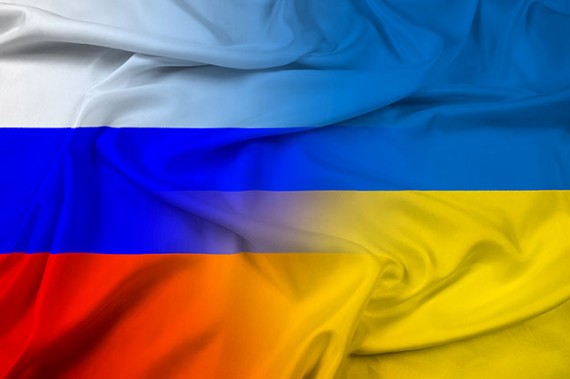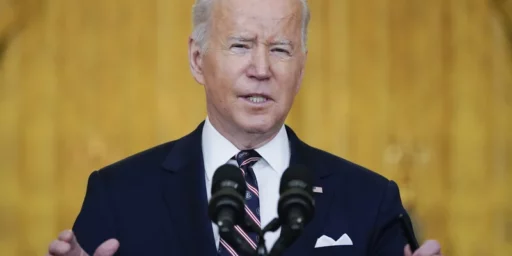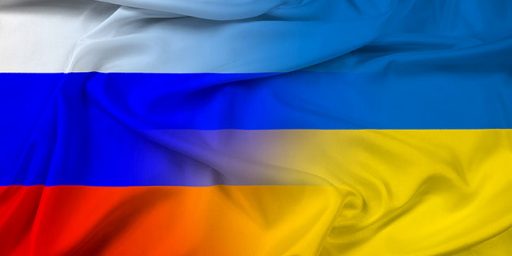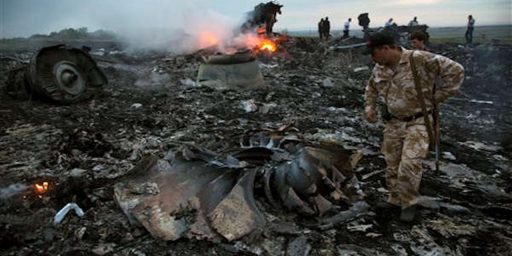Malaysia Airlines Flight 17 And The Future Of The Conflict In Ukraine
Yesterday's events are likely to be a game changer, but how the game plays out depends largely on how Europe reacts.
As the international community tries to begin an investigation into the downing of Malyasia Airlines Flight 17 notwithstanding the fact that the wreckage is contained in an area held by pro-Russian separatists who don’t seem all that interested in letting outsiders in during the middle of their war against Ukraine, attention is turning to what all of this might mean for the future of a conflict that has been brewing for some five months now, virtually from the moment that Sochi Olympics ended and Vladimir Putin turned his attention westward. The incident came after a roughly two week period during which tensions between Russia and Ukraine escalated significantly after a period during which they seemed to calm down at least somewhat, the Ukrainians seemed to be making significant advances against the rebels, and there were signs that President Putin was possibly preparing to throw the separatists in the east under the bus if it suited his interests. Since then, we’ve seen an increase in tensions along the border, and most notably the shooting down of several Ukrainian military planes, including one incident that American intelligence concludes had happened via a weapon fired from the Russian side of the border. To a large degree, though, the world’s attention, and especially the attention of Americans, had drifted away from Ukraine until yesterday morning, even though it was clearly still something that the Obama Administration was following closely.
Now, with nearly 300 people from many different nations dead because a Malaysian plane flying out of a Dutch airport was shot out of the sky over eastern Ukraine, everyone is wondering what this means going forward. Today, President Obama called the attack an “outrage of unspeakable proportions,” and called for both sides (really the Russians and the separatists) to allow an independent investigation into the circumstances of the plane’s destruction. He also called on both sides to reach a cease fire in the eastern regions of Ukraine, although that was quickly rebuffed when word came out of a mass shooting mere miles from the cite where the plane’s wreckage landed and there reports that OSCE inspectors trying to get to the site were fired upon. Other reports, all unverified at this point, have stated that the plane’s voice and data recorders had already been confiscated by the separatists, and that the Buk Missile System suspected in the attack was spotted moving east toward the border with Russia. Russian President Putin, meanwhile, hasn’t said much publicly since his statement yesterday that Ukraine bears ultimate responsibility for the attack due to the fact that he had ramped up its offensive against the rebels in recent weeks. All of these initial reactions suggest that we’re headed into a period where the situation in Ukraine is likely to become far more serious than it has been to date.
Josh Marshall calls yesterday incident a “game changer”:
Europe and even America never cared that much about Crimea. It is difficult to dislodge an annexation when a majority of the population likely really did support it. And the Europeans, as long as the big red lines weren’t being crossed, are too tied to Russian fuels and their myriad other concerns to care that much about mischief on Ukraine’s eastern border. But having a passenger plane, filled with EU citizens, shot out of the sky above what is presumed to be the bubble of first world safety that is “Europe” is a game changing event not only in the Ukraine crisis but much more broadly about Putin’s role in Europe generally.
In a paradoxical way, I think the future ramifications of this are almost greater because it is about Russia’s recklessness and bumbling than it would be if it were more clearly a matter of intent. This is a f’-up on Putin’s part of almost mind-boggling proportions. Yes, a tragedy. Yes, perhaps an atrocity. But almost more threatening, a screw up. Malign intent is one thing. So is aggression. But goofs of this magnitude by someone who controls a massive military arsenal and nuclear weapons are in a way more threatening.
Julia Ioffe agrees:<
My first reaction to this was that this is a game-changer, and it’s a game-changer in that it drags in the outside world, but it’s hard to see what the consequences of this could be. Even if and when the evidence is marshalled to point to the rebels, what can the West do to punish them? What can it do to punish Russia for giving them these capabilities? What can it do to end the conflict? More sanctions? Putin’s been blowing them off and they haven’t altered his calculus all that much. A peacekeeping mission? There is still no appetite for boots on the ground and Russia still has that U.N. veto. Even if the U.S. gives Ukraine lethal military aid, it in no way guarantees that Kiev’s military will be able to crush the separatists, especially not without some bloody, horrific urban warfare. The plane went down, raised the stakes, but what can the West—or Moscow—really do about it?
The one thing we know now is that this conflict is now officially out of control.
When you have passenger planes being shot out of the sky, the observation that things are out of control hardly seems to be overreacting. We’ve known for some time now that the Russians were giving material and other aid to the separatists in the east, but it now seems apparent that this aid has gone much further than providing the types of weapons that might be used on a battlefield. Even if the Buk system that was used to shoot MH 17 down is one that was captured from the Ukrainians, as some reports yesterday suggested, it seems fairly apparent that the separatists could not have operated that system without the assistance of someone who was familiar with its operation. Theoretically, that could have come from someone who was in the Ukrainian military who is now on the separatist side since the Ukrainians have this weapons system themselves, but the most likely explanation is that it was Russian “advisers” who were involved in training these people sufficiently to allow them to operate the system and fire a missile at a target some 32,000 feet above their location. The idea that the Russians might be giving these separatists training the operation of advanced anti-aircraft systems is obviously quite concerning, and makes their previous actions to date seem all the more reckless since it doesn’t take much to figure out how openly trading this type of equipment could have consequences far beyond Ukraine.
As Romesh Ratnesar argues, that’s likely to cause the world to start paying a lot more attention to Ukraine, and that could be a problem for Vladimir Putin:
Until now, the desire of some members of the Obama administration for more aggressive multilateral action against Putin has been stymied by the reluctance of European governments, particularly Germany, to antagonize Russia. Business interests in the U.S. have also claimed that American companies could be hurt if they lose access to the Russian market. In the aftermath of the Malaysia Airlines disaster, which almost certainly claimed dozens of American and European lives, such voices will be drowned out by demands from the public that Russia be punished for supplying the weapons that may have brought the airliner down.
To the vast majority of Americans, Russia’s meddling in Ukraine has largely seemed of peripheral importance to U.S. interests. That calculus has changed. As we have argued before, Putin has far more to lose from a prolonged confrontation than does the West. His finance ministry has already warned that additional sanctions would crush economic growth. And as more Russian businesses get squeezed and living standards deteriorate, Putin’s base of political support will crumble.
Whether that happens will depend largely on how Europe reacts to what happened yesterday. Up until now, nations such as Germany and France have balked at some of the tougher sanctions that the Obama Administration was advocating against the Putin government and his business cronies. In no small part, this reluctance has been due to dependence on Russian energy supplies by many nations in Western Europe and the threat that sanctions would cause Putin to turn off the spigot (even though that would also turn off his nation’s biggest source of cash) and the fact that there are significant business ties between West and East in Europe that would be impacted by tighter sanctions. The question now will be whether the cold-blooded murder of nearly 300 people has changed the calculus in Berlin, Paris, and elsewhere.







Putin seems pretty secure domestically. Whatever the findings on the crash, the Russians will claim anti-Russian bias. It will hurt his standing in the international community. Most importantly, Putin has probably blown his chances at being named the 2016 GOP POTUS candidate. They will need to find a new macho man.
Steve
@steve:
Easy. Netanyahu.
europe needs the oil, putin will hide behind the “separatists” and maybe tone down the military support (which appears to have caused this) and the “un” will launch some lame investigation that results in nothing. some sanctions will hurt russia but everyone will be holding hands again in a few months. now if it were a US or western airline involved, things would be dicey as putin would really have to suck up to whomever.
Gas. Russian oil has no leverage. Natural gas.
A lot depends on whether or not the rebellion is the purely Russian creation as we are being told it is or an actual rebellion. If it is real they have probably just thrown a giant monkey wrench in their own ability to check Ukrainian air power as shooting at aircraft became much more complicated, and that could be a game-changer. However, the world’s focus has a downside for the Ukrainians as well. Their practice of using heavy artillery on cities stands to embarrass their staunch ally and new BFF the US, which has precisely and vociferously condemned that very thing in Syria recently. Losing that could be a game changer for them as well.
So Josh Marshall thinks this is a “game changer” because….he declares it to be so? If he had any regional expertise I might be inclined to take his usubstantiated opinion more seriously, but since he doesn’t…
IMO this is only a potential game changer for the Ukrainian rebels, in particular how this affects support from Moscow. Russia will, no doubt, give a lot more attention to the potential consequences of lethal aid. Beyond the obvious, it may drive Russia to distance itself and provide assistance that is deniable. At worst (for the Rebels) Russia could wash their hands and tell the rebels they’re on their own. Not likely though, the rebels are too important a tool. So at the end of the day, it’s likely this tragedy will not have a huge effect.
Ball’s still in the EU’s court. Should’ve started up some sort of strategic petroleum reserve, or added to it.
@Andy: Did you miss the part where Julia Ioffe said pretty much the same thing Marshall did?
Can anyone name a case where something like this has worked, ever?
@Ebenezer_Arvigenius: …Iran? I thought the consensus was the increased sanctions had eroded their economy to the point they were willing to negotiate.
The kind of sanctions on Russia? Not by a long shot will it have a similar effect.
@Tillman: Julia did not say the same thing, she has a pretty significant “but” in there followed by alot of pertinent questions which conclude with “The plane went down, raised the stakes, but what can the West—or Moscow—really do about it?”
Raising the stakes is not changing the game.